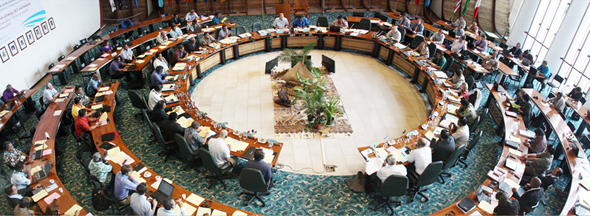Representatives of 22 Pacific Island countries and territories have supported an agenda for change designed to position the Secretariat of the Pacific Community (SPC) for the future and enhance the organisation’s impact on people’s lives.
Also among the outcomes of the 44th Meeting of the Committee of Representatives of Governments and Administrations (CRGA 44), members agreed that further debate on regional architecture and harmonising the Council of Regional Organisations in the Pacific (CROP) system was needed, and requested SPC to follow up with other agencies prior to the 2015 Pacific Islands Forum Leaders Meeting.
CRGA 44 took place from 4-7 November at SPC headquarters in Noumea, New Caledonia.
The annual decision-making forum was attended by 67 delegates and 18 observers, and was chaired by the Ambassador of the Republic of the Marshall Islands to Fiji, His Excellency Frederick Muller, with the Consul-General of the Republic of Nauru, Mrs Chitra Jeremiah, as Vice-Chair.
SPC Director-General, Dr Colin Tukuitonga, said that as the SPC was a sound organisation recognised for its world-class scientific and technical expertise, the challenge put to CRGA 44 was how the SPC could do better.
“The SPC’s agenda for change is about charting a course to enhance the development effectiveness of our work, within resource constraints and recognising the different needs and capacities of our member countries and territories,” Dr Tukuitonga said.
“I’m encouraged to hear there is affirmation not only in terms of what we’re trying to achieve but how we’re planning to go about attaining organisational change and a shift to a more integrated, multi-sector approach to our work,” he said.
The members endorsed the presentation of SPC’s first Programme Results Report (2013‒2014) and its emphasis on how SPC’s work contributes to members’ long-term sustainable development goals and provided positive feedback on country programme reports for each of SPC’s 22 members.
There was agreement to establish a CRGA sub-committee to ensure close engagement and input from member governments on SPC’s new Corporate Strategic Plan.
Timor Leste moved one step closer to becoming the 23rd participating Government of the Pacific Community. Provided Timor Leste formally accedes to the treaty without complications, its membership will be formally recognised at the Conference of the Pacific Community in 2015.
While the members decided not to amend the Canberra Agreement at this time to provide for new SPC categories of Associate Member and Observer, a working group on membership was mandated to develop an SPC Policy on Permanent Observer Status to be put forward for adoption next year.
The committee noted the progress made by Pacific Island countries to develop integrated climate and disaster risk management approaches and commented on a draft Strategy for Climate and Disaster Resilient Development in the Pacific, a new regional policy instrument aimed at building the resilience of Pacific Island communities.
The meeting also heard how a forthcoming visit to SPC headquarters in Noumea by the President of the Republic of France, Mr François Hollande, on 17 November would centre on climate change issues.
“We’ve invited all the Pacific leaders and representatives of other Pacific organisations to Noumea for this conversation on the critical issue of climate change and we’re delighted to have confirmation from five Pacific leaders already,” Dr Tukuitonga said.
Along with representatives of all members of the Pacific Community, CRGA 44 was attended by observers and partners including the European Union, Singapore, Timor Leste, University of the South Pacific, Melanesian Spearhead Group, Pacific Islands Forum Secretariat, Secretariat of the Pacific Regional Environment Programme (SPREP) and, for the first time, the Pacific Disability Forum.
Addressing the delegates on the closing day of CRGA 44, the Chief Executive Officer of the Pacific Disability Forum, Mr Setaraki Macanawai, appealed for appropriate resources to be allocated to assist the 800,000 Pacific Islanders living with disabilities.
“We see integrating disability-inclusive development as essential if the Secretariat of the Pacific Community is to leave no one behind,” Mr Macanawai said.
The SPC’s governing body, the Conference of the Pacific Community, meets every two years. In alternate years, the committee members determine SPC’s work programme and governance matters. Additionally, reforms to the committee itself were agreed, including refreshing its terms of reference and adopting a principle of continuity which will see member representatives retained for longer.
In 2015, the CRGA will take place in Alofi, Niue, under the chairmanship of Nauru, with New Caledonia as the Vice-Chairperson.
A Pacific Gender and Climate Change Toolkit launched at the meeting on Thursday is available on the Pacific Climate Change Portal: www.pacificclimatechange.net.




